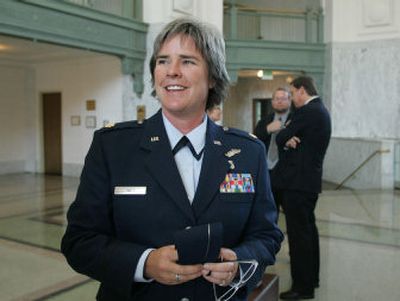Air Force opposes federal injunction

TACOMA – Government attorneys asked a federal judge Friday not to intervene in the Air Force’s efforts to oust a decorated officer for being a lesbian.
Maj. Margaret Witt, who lives in Spokane, is seeking a federal injunction. She wants to keep serving as a flight nurse while her American Civil Liberties Union lawyers challenge the military’s policy on homosexuality.
“There’s no harm to the Air Force or the public here,” said Witt’s attorney, James Lobsenz, adding that flight nurses are critically needed. “I don’t think any of those patients have ever looked up at her and said ‘I don’t want to be treated by a lesbian, get me a heterosexual.’ “
The Air Force argues that Witt’s lawsuit is premature. Although suspended from training or deploying with her unit for nearly 20 months, Justice Department lawyer Peter Phipps said, the reservist hasn’t been discharged yet. That’s an issue to be taken up by an Air Force appeals board. A hearing is tentatively slated for this summer.
Nor, Phipps said, has the major been harmed enough by the suspension to justify an injunction.
“Here there has not been a constitutionally significant deprivation,” he told U.S. District Court Judge Ronald Leighton.
At President Bill Clinton’s urging, the U.S. military in 1994 adopted a “don’t ask, don’t tell” policy on gays and lesbians. Under it, people who acknowledge they’re homosexual can be booted from service.
Part of Witt’s court challenge may involve the fact that her relationship was with a civilian woman, rather than anyone in her unit. If the court draws a distinction between such relationships, it would likely prompt a flurry of challenges to the Pentagon policy.
“From where I sit, it would mean virtually the end of ‘don’t ask, don’t tell,’ ” said Judge Leighton.
He said he’ll try to have a ruling within weeks.
Witt’s attorneys are relying on a 2003 U.S. Supreme Court decision, Lawrence v. Texas, in which the high court struck down a state anti-sodomy law. Liberty, Justice Anthony Kennedy wrote in that ruling, presumes “freedom of thought, belief, expression and certain intimate conduct.”
The military has long said that asking troops to live with, shower and bed with openly gay and lesbian troops would destroy unit cohesion and effectiveness. Lobsenz said similar arguments were made to try to prevent integration of whites and blacks in the armed forces decades ago. (Phipps said after the hearing that Justice Department policy barred him from commenting on the case.)
Witt, 42, joined the Air Force in 1987 after working as an operating-room nurse in Tacoma. After nine years on active duty, she became a reservist in 1995. In civilian life, she’s a physical therapist in Spokane.
Two years ago, someone tipped off the Air Force that Witt was a lesbian. The Air Force investigated, and a civilian woman said she and Witt “had engaged in a committed and loving relationship from July 1997 through October 2003.”
In November 2004, a stunned Witt was called into her commander’s office and told to stop reporting for reservist duty. The Air Force, she was told, was discharging her “on grounds of homosexual conduct.”
Since that day, she’s worn her uniform exactly twice. Once was for an April press conference in Seattle, at which she announced that she was fighting to stay in the military. The second time was Friday, as she sat intently watching the lawyers talk about her in a large courtroom inside Tacoma’s Union Station courthouse.
“It always comes down to people discussing sex,” she said afterward, adding that she’s much more than that.
Witt’s decision to fight the military’s “don’t ask, don’t tell” policy has propelled her into the national spotlight.
“People are Googling me,” she said, referring to the Internet search engine. “You couldn’t find me anywhere before that day” of the April press conference.
Many former airman colleagues have called with encouragement, she said. People she served with in California, Germany, Illinois and other places have tracked her down and phoned.
“That was really humbling,” she said. “I can’t tell you what that means.”
She said she’s perplexed at why her discharge appeal hearing still hasn’t been scheduled after nearly two years.
“I know that with the military it’s a waiting game,” she said, “but when it comes down to something so serious that affects your life, it seems a little odd. If I’m going to go out there in the desert again, I’m not getting any younger.”
The Associated Press contributed to this report.